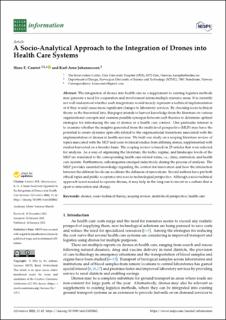| dc.description.abstract | The integration of drones into health care as a supplement to existing logistics methods may generate a need for cooperation and involvement across multiple resource areas. It is currently not well understood whether such integrations would merely represent a technical implementation or if they would cause more significant changes to laboratory services. By choosing socio-technical theory as the theoretical lens, this paper intends to harvest knowledge from the literature on various organizational concepts and examine possible synergies between such theories to determine optimal strategies for introducing the use of drones in a health care context. Our particular interest is to examine whether the insights generated from the multi-level perspective (MLP) may have the potential to create dynamic spin-offs related to the organizational transitions associated with the implementation of drones in health services. We built our study on a scoping literature review of topics associated with the MLP and socio-technical studies from differing arenas, supplemented with studies harvested on a broader basis. The scoping review is based on 25 articles that were selected for analysis. As a way of organizing the literature, the niche, regime, and landscape levels of the MLP are translated to the corresponding health care-related terms, i.e., clinic, institution, and health care system. Furthermore, subcategories emerged inductively during the process of analysis. The MLP provides essential knowledge regarding the context for innovation and how the interaction between the different levels can accelerate the diffusion of innovations. Several authors have put both ethical topics and public acceptance into a socio-technological perspective. Although a socio-technical approach is not needed to operate drones, it may help in the long run to invest in a culture that is open to innovation and change. | en_US |

